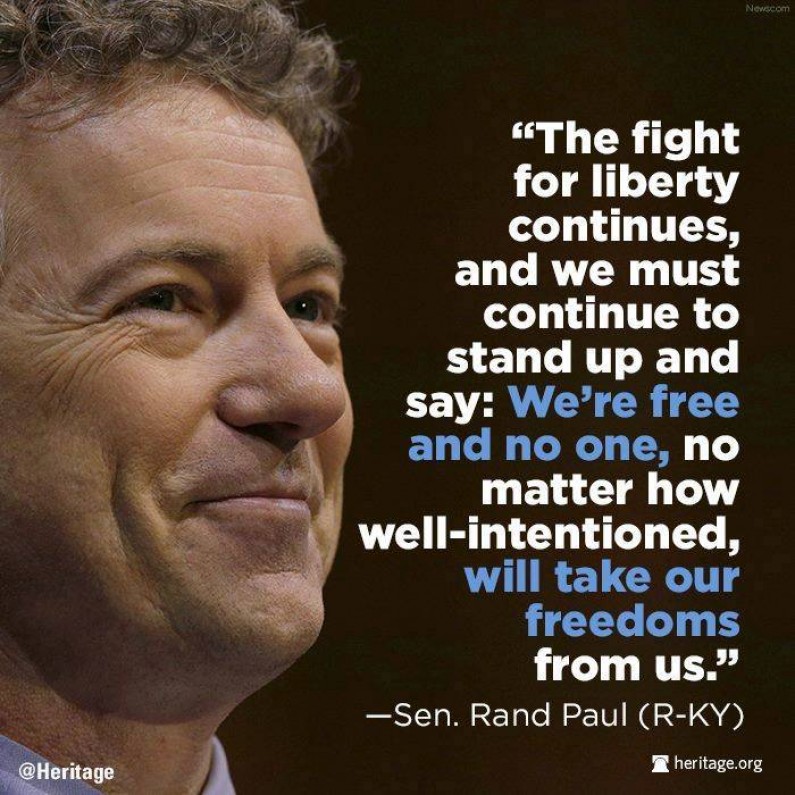

VIA Washington Post by Chris Cillizza
You might have heard that Rand Paul has officially entered the presidential race.
“I have a vision for America,” the GOP senator from Kentucky said, kicking off his campaign in Louisville on Tuesday. “I want to be part of a return to prosperity.”
The announcement surprised no one since Paul has made clear for the better part of the past two years that he was going to run for president in 2016. But his announcement is a nice peg to try to answer this key question: Can he actually win?
The answer, I think, is yes — although to do so Paul would not only need to overcome a crowded and talented field of rivals but also be on the leading edge of a transformation of the Republican Party, the likes of which we haven’t seen in more than three decades.
Let’s start with the purely practical considerations that make Paul either a top tier or a just-off-the-top-tier candidate. Consider:
- Thanks to his father’s two past presidential bids in 2008 and 2012, Rand Paul starts with organizations in Iowa, New Hampshire and South Carolina that are significantly more advanced than what all of the other candidates not named Jeb Bush currently have.
- Again, thanks in no small part to his dad, Rand Paul is a known — and liked — commodity in those early voting states, a status reflected by his standing in polls in each. (Here’s Iowa courtesy of Real Clear Politics’ terrific polling site; and, here’s New Hampshire.)
- The committed — and mostly online — fundraising base that helped Ron Paul raise $39 million for a quixotic 2012 primary campaign is ready, willing and able to do the same for Rand. While he won’t raise the money of Jeb or probably even Wisconsin Gov. Scott Walker, the younger Paul will have plenty to make his case to voters in Iowa, New Hampshire, South Carolina and beyond.
- He occupies space — the libertarian wing of the GOP — that no one else is even trying to fight him for. While, as the New York Times’ Nate Cohn notes, the libertarian portion of the GOP isn’t big enough to deliver Rand the nomination, it is big enough to form a loyal and cohesive base from which he will try to expand outward. From there, he’ll go after tea partiers and social conservatives.
- That combination of traits — organization, name ID, money and a base — puts Rand in rarefied territory in the race and virtually ensures that he will be hovering in and around the top tier for most of the contest.
The harder to answer and more important question is just how much change the Republican Party really wants. The simple truth is that Rand is, by far, the most “different” candidate — in terms of his views — of anyone who will seek the Republican presidential nomination. (The difference between, say, Ted Cruz and Marco Rubio might seem vast but it’s not; it’s almost entirely tonal and not, really, issue-based.)
While Paul is doing what he can to hedge some of his views so as to be avoid being typecast as “the libertarian guy in the race”, there’s little question that, particularly on matters of national security and foreign policy, he represents a decidedly different direction than not only the rest of the 2016 field but also the recent policy path taken the Republican party.
[Rand Paul seems to stray from libertarian roots as he courts GOP base]
In his announcement speech, Paul scolded conservatives who “believe a government inept at home will somehow succeed in building nations abroad.” He insisted: “We need a foreign policy that protects American interests and encourages stability, not chaos.” He talked about the deep societal dangers of the National Security Agency’s domestic spying program, insisting that on his first day as president, “I will immediately end this unconstitutional surveillance.”
None of that rhetoric will send the Republican establishment headed for their fainting couches. (Are those still a thing?) But the ideas Paul has espoused that comprise the framework on which that not-all-that-controversial rhetoric sits both: a) do represent a real change in approach for a party who, since at least Reagan, has championed a very muscular foreign policy and b) will become a major point of attack for Paul’s rivals. (To that latter point, an outside group aligned with Republican admaker Rick Reed is set to launch a seven-figure ad buy in early primary states on Tuesday, hitting Paul for his alleged support of President Obama’s position on Iran.)
There’s little doubt that most Republican voters are looking for fresh faces promising change in 2016. That goes double for a race where a member of the Bush clan is running and, to date, not getting the sort of warm welcome from voters that he and his team likely expected. (Sidebar: Jeb is getting a great reception from donors.) The question for Paul is whether the kind of change his candidacy promises — a non-interventionist foreign policy, domestic policies heavily influenced by the government-needs-to-leave-me-alone mentality of libertarianism — is the both the kind of change and the right amount of change that people are seeking.
What Rand seems to be selling is this: I am different. But, I’m not scary. The battle to be the right kind of change is at the center of Paul’s challenge over the next year or so. If he can sell voters on the idea that the change he represents is the change they need (and want), he might be a real threat to be the nominee. If his rivals effectively cast him as the purveyor of a frightening and/or out of touch vision for America, he will be one of the many castoffs of this crowded race.

